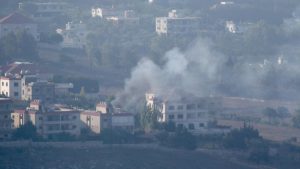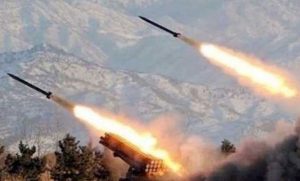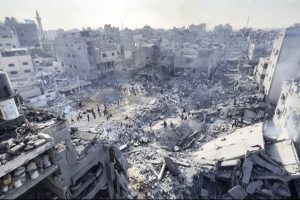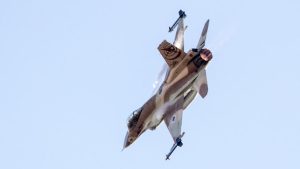Israel and Hezbollah Pull Back from All-Out War After Intense Fire Exchange

In a dramatic escalation of tensions, Israel and Hezbollah engaged in their most intense exchange of fire in months on Sunday. This alarming situation raised fears of an all-out war. The conflict began as Israel launched airstrikes across southern Lebanon, claiming it was a preemptive measure against an imminent Hezbollah attack. This flare-up occurs amid ongoing conflict in Gaza, highlighting the fragile state of regional stability.
Early Sunday, Israeli forces deployed around 100 warplanes to target what they described as thousands of rocket launchers in southern Lebanon. They aimed to thwart a planned barrage from Hezbollah. In retaliation, Hezbollah fired hundreds of rockets and drones at Israeli military installations and missile defense sites in northern Israel and the Golan Heights. This exchange marks a critical moment in the ongoing hostilities that have characterized the region since the Israel-Hamas war began last October.

Hezbollah framed its actions as a direct response to the assassination of Fouad Shukur, a prominent commander within the group. He was killed in an Israeli airstrike in Beirut the previous month. The militant group declared its operations a preliminary phase, setting the stage for deeper strikes into Israeli territory. By mid-morning, both sides reported a cessation of hostilities. They claimed their actions targeted only military objectives. However, the toll of this exchange was evident. Lebanese officials confirmed at least three fatalities from the Israeli strikes, while Israel reported no casualties.
The intensity of the exchanges heightened fears of a broader conflict that could engulf not only Israel and Hezbollah but also draw in regional powers such as Iran and the United States. The last major confrontation between these two entities in 2006 resulted in widespread devastation and a humanitarian crisis in Lebanon. Experts warn that any future conflict could be even more catastrophic, given Hezbollah’s enhanced military capabilities, which include an estimated 150,000 rockets capable of striking any part of Israel.
Despite the recent escalation, both Israel and Hezbollah appear cautious. Israeli Prime Minister Benjamin Netanyahu emphasized the need to restore peace along the border. He expressed a preference for diplomatic resolutions while maintaining readiness for military action if necessary. Hezbollah’s leadership has similarly stated that while they do not seek a broader conflict, they are prepared for one should it arise.

The regional context complicates the situation further. As the conflict in Gaza continues, with over ten months of hostilities resulting in significant casualties and displacement, Hezbollah’s actions have been framed as solidarity with the Palestinian cause. The group has indicated it would halt its strikes on Israel if a cease-fire were established in Gaza. This highlights the interconnected nature of these conflicts.
In the meantime, Egypt is hosting high-level talks aimed at brokering a cease-fire in Gaza, hoping to alleviate regional tensions. The outcome of these discussions could play a crucial role in determining whether the recent hostilities escalate into a full-scale war. U.S. officials are closely monitoring the situation, underscoring the potential for a broader conflict that could involve multiple actors in the region.

As the dust settles from Sunday’s exchanges, the atmosphere remains charged. Air raid sirens echoed throughout northern Israel, and Ben-Gurion International Airport temporarily diverted flights due to the threat of attack. Initial assessments from Israeli military officials indicated minimal damage within Israel. However, the heightened alert level remains in place as both sides prepare for potential further escalations.
The implications of a full-scale war between Israel and Hezbollah would be dire. A conflict could lead to widespread destruction in Lebanon, particularly in areas where Hezbollah maintains strongholds. The humanitarian impact would likely be severe, displacing hundreds of thousands of civilians on both sides of the border. Furthermore, such a war could disrupt the already fragile Israeli economy and necessitate military engagement on multiple fronts, stretching the capabilities of the Israeli Defense Forces.
As tensions simmer, the international community watches closely, recognizing that the stakes are high. The potential for a broader regional conflict looms large, with Iran’s involvement as a key factor. The situation remains fluid. While both sides have pulled back from the brink of all-out war for now, the underlying tensions suggest that this fragile peace may not hold for long.
The recent exchange of fire between Israel and Hezbollah serves as a stark reminder of the volatility in the region. With both sides asserting their military capabilities and readiness for conflict, the path to lasting peace remains fraught with challenges. The coming days and weeks will be critical in shaping the future of this enduring conflict and determining whether diplomacy can prevail over the specter of war.

